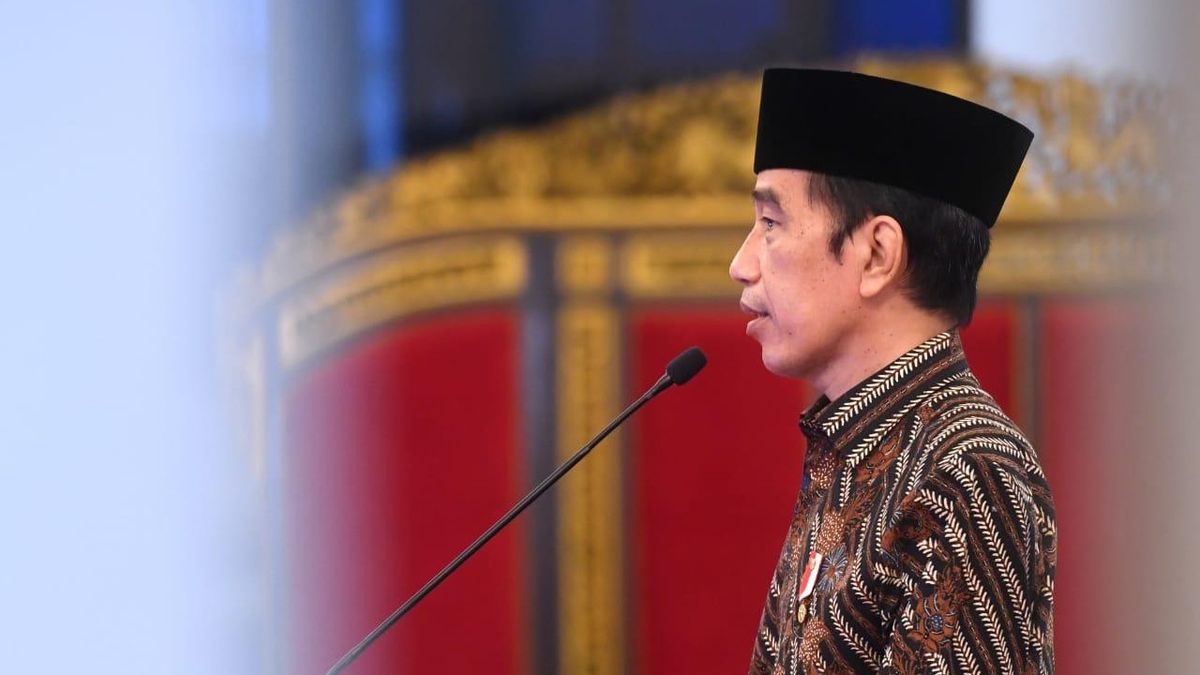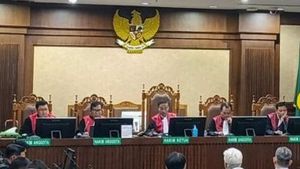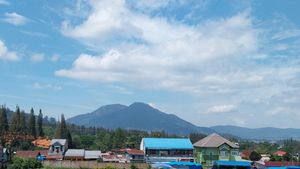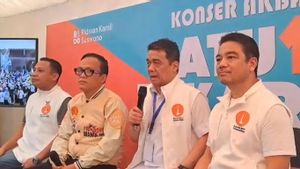JAKARTA - President Joko Widodo has repeatedly emphasized that he has no intention of becoming president for three terms. Jokowi also does not want an amendment to the 1945 Constitution of the Republic of Indonesia to add to the presidential term.
"What else should I say? Back and forth, my attitude has not changed. I emphasize that I have no intention. I have no intention of becoming president for three terms. The constitution mandates two terms. That is what we must protect together," said Jokowi at the State Palace, Central Jakarta, Monday, March 15.
Jokowi asked all parties not to increase the noise by rolling out the issue of his desire to increase his term of office as R1. Especially in the middle of the COVID-19 pandemic situation.
"Don't make any new noise. We are currently focusing on handling the pandemic," said Jokowi.
Then, why is the issue of extending the president's term back?
The discourse on extending the term of office of the president is actually not new. Previously, at the end of 2019, the proposal to amend the 1945 Constitution by changing the term of office of the president had also surfaced.
The idea is said to have originated from the NasDem Party faction in the House of Representatives of the Republic of Indonesia (DPR RI). However, this issue was also denied by Surya Paloh's men.
"That is a public suggestion. The amendment of the Constitutional must listen to public opinion, involve the wider community, academia, leaders, all parties in society," said Secretary-General of the NasDem Party Johnny G. Plate at the Presidential Palace, Jakarta, Thursday, December 15, 2019.
Not only in the Jokowi era but the issue of extending the presidential term to three terms also emerged in the era of President Susilo Bambang Yudhoyono (SBY).
However, the proposal drew harsh criticism and a broad wave of resistance from the public, so it ran aground halfway.
So, who really plays on this issue?
Amien Rais, is the one who raised again the issues of the 3 periods presidency. The former chairman of the People's Consultative Assembly (MPR) suspects that there will be a scenario to change the provisions in the 1945 Constitution regarding the term of office of the president from two terms to three terms.
According to Amien, the plan to amend these provisions will be carried out by holding a Special Session of the People's Consultative Assembly (MPR) to amend or amend the 1945 Constitution.
Amien claimed to have received political signals related to the scenario that is being carried out by a number of parties to do this. One of them is through political maneuvers currently carried out by the government by securing all state institutions, starting from the House of Representatives (DPR), People's Consultative Assembly (MPR), Regional Representative Council (DPD), and other state institutions.
"So now there is a kind of public opinion, which at first was vague but now it is increasingly clear which direction Jokowi's regime is going. So they will take the first step to ask for a special session of the People Consultative's Assembly (MPR), which may be one or two articles which he said need to be corrected which I also don't know, but later it will be offered and then give the president the right to be elected three times, now if this is really their wish," said Amien via YouTube Channel Amien Rais Official which was uploaded at 20.00 Western Indonesia Time, Saturday, March 13.
Is it true that Jokowi rejects the idea of extending the presidential term to three terms?
Deputy Chairperson of the DPN of the Indonesian People's Wave Party (Gelora), Fahri Hamzah believes that the discourse of the 3 terms of the president's term did not come from Joko Widodo's wishes.
According to Fahri, it is necessary to investigate who designed the issue. Including the aims and objectives to enliven in the media.
"That is what I think we have to trace now. Because if it is not possible from the president himself. Why? I myself have asked the president twice about this before the end of the office, and the answer is unanimous, he (Jokowi, ed) said he did not want to be remembered as a person who wanted to return to the office," Fahri said in his statement in Jakarta, Wednesday, March 17.
Fahri suspected that there were parties who deliberately raised the issue of the 3 periods. Moreover, it has become a culture in society to neutralize information which is then used by a handful of groups for certain interests.
"My guess is that if we are not naive, this will become news on social media which has happened frequently. And we are over-acting with the news," said Fahri.
"Or the second is that there are groups that are blowing up this issue, for the interests of their groups, of course," he continued.
Do not let past events exist
Executive Director of the Voxpol Center Research and Consulting, Pangi Syarwi Chaniago, emphasized that the proposed three-term discourse is very, very inappropriate and contradicts the reform goal of limiting the term of office of the president.
"The rule of the struggle for our purification presidential system is to limit the term of office of the president," he said.
Moreover, continued Pangi, until this issue reoccurred, the public had never heard of any substantive and rational reasons why the presidential term should be added or extended.
"We need reasons that make more sense (common sense) instead of leading political debates and discourse into support like the opposition versus the government or the last presidential election debate which was unproductive and minus argumentative," he said.
However, continued Pangi, it seems that the public should also be suspicious that the agenda for the addition of the presidential term is being prepared seriously and carefully even though it does not have a strong argument.
"Then why is the discourse on adding a presidential term blown every year? I respect the president whose statements and comments and the right to reply remain consistent and have not changed to this day. This has become a digital track record," he said.
"Do not let, like past events, the offer came to be a presidential candidate, initially not interested, not thought about, not interested, suddenly became a presidential candidate," he added.
Changing the Amendment to 'Goals' the President for 3 Periods, Not Easy!
The Chairman of the Indonesian People's Consultative Assembly Bambang Soesatyo (Bamsoet), Monday 15 March, emphasized that the conditions for amending the 1945 Constitution are not easy.
The current 1945 Constitution has undergone four changes. To be able to re-amend it for the fifth time, it takes proposals for amendments from one-third of the members of the People's Consultative Assembly.
Currently, there are 711 members of the People's Consultative Assembly (MPR), consisting of members of the House of Representatives (DPR) and members of the Regional Representative Council (DPD). So, at least 237 People's Consultative Assembly (MPR) members proposed amendments.
This is stated in Article 37 paragraph 1 of the 1945 Constitution:
Proposals for amendments to articles of the Constitution can be scheduled in the People's Consultative Assembly session if they are submitted by at least 1/3 of the total members of the People's Consultative Assembly.
The next paragraph confirms that each proposed amendment to the articles of the Constitution is submitted in writing and it is clearly indicated that the part that is proposed to be changed along with the reasons for it. After the applicant fulfills the quorum, it is taken to the People's Consultative Assembly (MPR) Session for approval. Furthermore, the People's Consultative Assembly (MPR) Session must be attended by at least 2/3 members of the People's Consultative Assembly (MPR) or as many as 474 legislators/senators.
This is in accordance with Article 37 paragraph 3 of the 1945 Constitution:
To amend articles of the Constitution, the People's Consultative Assembly Session is attended by at least 2/3 of the total members of the People's Consultative Assembly.
After all the material has been discussed and approved by the People's Consultative Assembly (MPR) Session, the final step is the ratification of the Fifth Amendment to the 1945 Constitution at the MPR Session. This agreement was attended by at least 357 MPR members. This requirement is strictly regulated in Article 37 paragraph 4:
The decision to amend articles of the Constitution is made with the approval of at least fifty percent plus one member from all members of the People's Consultative Assembly.
To note, constitutional amendments in various parts of the world are not taboo. The United States Constitution has been amended 27 times to this day. The last amendment in 1992 on the rights of members of senators and legislators is the same.
The English, Chinese, Japanese, Arabic, and French versions are automatically generated by the AI. So there may still be inaccuracies in translating, please always see Indonesian as our main language. (system supported by DigitalSiber.id)













